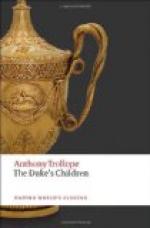This is only interesting to us as affecting the happiness and character of the Duke. He had consented to assist Mr Monk in forming a government, and to take office under Mr Monk’s leadership. He had had many contests with himself before he could bring himself to this submission. He knew that if anything could once again make him contented it would be work; he knew that if he could serve his country it was his duty to serve it; and he knew also that it was only by the adhesion of such men as himself that the tradition of his party could be maintained. But he had been Prime Minister,—and he was sure he could never be Prime Minister again. There are in all matters certain little, almost hidden, signs, by which we can measure within our own bosoms the extent of our successes and our failures. Our Duke’s friends had told him that his Ministry had been serviceable to the country; but no one had ever suggested to him that he would again be asked to fill the place which he had filled. He had stopped a gap. He would beforehand have declared himself willing to serve his country even in this way; but having done so,—having done that and no more than that,—he felt that he had failed. He had in soreness declared to himself that he would never more take office. He had much to do to overcome this promise to himself;—but when he had brought himself to submit he was certainly a happier man.
There was no going to see the Queen. That on the present occasion was done simply by Mr Monk. But on the Wednesday morning his name appeared in the list of the new Cabinet as President of the Council. He was perhaps a little fidgety, a little too anxious to employ himself and to be employed, a little too desirous of immediate work;—but still he was happy and gracious to all those around him. ‘I suppose you like that particular office,’ Silverbridge said to him.
‘Well; yes;—not best of all, you know,’ and he smiled as he made this admission.
‘You mean Prime Minister.’
’No, indeed I don’t. I am inclined to think that the Premier should always sit in your House. No, Silverbridge, if I could have my way,—which is of course impossible, for I cannot put off my honours,—I would return to my old place. I would return to the Exchequer where the work is hard and certain, where a man can do, or at any rate attempt to do, some special thing. A man there if he stick to that and does not travel beyond it, need not be popular, need not be a partisan, need not be eloquent, need not be a courtier. He should understand his profession, as should a lawyer or doctor. If he does that thoroughly he can serve his country without recourse to that parliamentary strategy for which I know that I am unfit.’
‘You can’t do that in the House of Lords, sir.’
’No; no. I wish the title could have passed over my head, Silverbridge, and gone to you at once. I think we both should have been suited better. But there are things which one should not consider. Even in this place I may perhaps do something. Shall you attack us very bitterly?’




